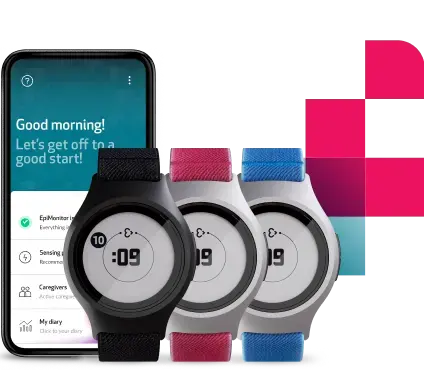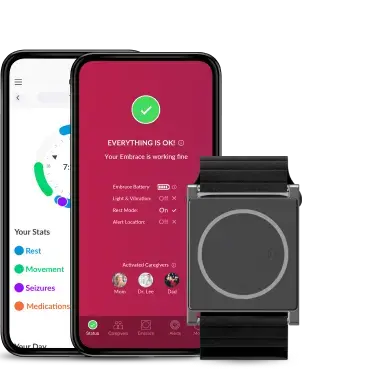Things I Wish My Neurologist Had Told Me by C. Patrick Brown, MD
Raise your hand if you or someone you love has epilepsy.
Okay. Now a show of hands if that same someone is also completely and totally awesome (at least most of the time).
Of course you are! They are! We are! Awesome, that is.
And you probably haven’t heard that enough. So, let’s just get that out of the way before you finish your buttered toast this morning.
You are awesome.
There’s no denying it. Really.
I’ve known hundreds of patients and families with epilepsy in nearly a decade as a pediatric epileptologist. We’ve walked through the fire together. I have been a witness to so much awesomeness even as families felt like their lives were turned upside down and falling apart.
At the same time, underneath my white coat, I’ve been a patient with epilepsy, too. Just like you. Yep. As I’m giving you the speech on not forgetting to take your meds, I’m probably trying to remember if I took my own before I left the house, too.
And in all my years living with epilepsy and taking care of patients and families with epilepsy, I’ve noticed a few themes lurking in the deep waters, things we may not get to talk about or address in a quick follow-up visit. These are things no doctor ever talked to me about, but I wish they had.
You don’t have to feel alone in your life with epilepsy.
Let me say that again.
You don’t have to feel alone, because you are not alone.
Epilepsy can be such an isolating diagnosis. While some families are fantastic at embracing their diagnosis, for many, being diagnosed with epilepsy is like being handed a dark secret to keep. It can feel like a double whammy—first you have to deal with seizures that can strike any time, then you have to come to terms with having this mysterious disease.
I saw a brilliant 6th grader last week, who stared at me in disbelief and asked, “so do I have epilepsy?” His whole world was turned upside down with the thought. As hard as I tried to convince him that he was the same awesome guy now “with epilepsy” as he was minutes before he’d come to see me, he was struggling to with it all, and rightfully so.
I remember being seventeen, walking alone down library stacks, secretly picking out books on epilepsy, trying to figure out what my own diagnosis would mean for me. (This was before the internet!).
Here’s an important question I ask my patients: Do you know anyone else who has epilepsy? Or epilepsy like yours?
At first I was surprised to learn that most kids knew absolutely no one else living with epilepsy (even though one person in 26 will have it and I’d seen seven of them that day!). If they said “no”, then I’d shake their hand and inform them that now they knew at least one.
Then I remembered, I was in my thirties before I had a real friend who also had epilepsy. That was over a decade after my diagnosis!
So…what to do? Here’s my revolutionary idea.
Find a Friend.
It only takes one! When a colleague shared with me he had the same epilepsy diagnosis as I had (only he didn’t openly disclose his diagnosis for fear of being treated poorly by other doctors! YES! It happens!), it literally changed my life. I now had at least one other person who understood what I dealt with every day. We’ve been close ever since, even though they live halfway across the country from me.
What are some ways to find this connection? None of us are walking around with a t-shirt that says “I HAVE EPILEPSY—COULD USE A FRIEND”, even though that may be the very thing we need. (The friend, not the t-shirt).
Attend local Epilepsy Foundation events. Talk to people. Practice sharing your story and you’ll find you’re not alone at all. Once I started sharing my own story, I learned my barber, my next-door neighbor, and so many others had epilepsy, too. In the process, I felt less alone.
Epilepsy camps can be great places for kids to make friends. At Camp Oz in Minnesota and Camp Spike n’ Wave in Texas I’ve seen kids form long-lasting friendships and I’ve made a few friends there, too. Usually playing kickball.
Your doctor or clinic may also help host events (require they be actually fun and not lame) that bring together patients, helping us feel like we’re all in this together. Brainstorm some ideas. Or contact me and I’ll be happy to brainstorm along with you.
Another thing I wish my neurologist had told me is…
I Know You’re afraid and It’s Okay (now let’s tackle this fear head on)
We don’t openly talk about fear in the epilepsy world even though it’s always there in the background of everything we say and do.
I think as doctors, maybe we’d rather pretend it didn’t exist. I certainly had no formal training on addressing patient’s fears.
As a patient, my last major seizure was over twenty years ago, yet I still worry, especially if I’ve missed a dose of meds or if I didn’t get much sleep. I still have this voice that says, “today sure would be a bad day to have a seizure.” Sometimes the voice chimes in when I’m driving my family on a high mountain road with steep cliffs and no guardrail (not helpful!).
Fear is a punk (another t-shirt we need) and I usually tell it to shut up, but for most of us, these fears are not entirely imaginary.
I didn’t hear about SUDEP (sudden unexplained death from epilepsy) from my neurologist. I heard about it from my daughter’s pediatrician, who sadly lost her husband, a medical resident, to SUDEP. He had been a doctor in my same hospital.
At the time, I was pediatric resident and I’d be lying to you if I told you that it didn’t shake me up quite a bit. I don’t think I told anyone about my new worries either.
So…what to do?
Well, we combat fear by knowing the facts and by doing everything we can to live with freedom. We strive for seizure control, we take our meds consistently, we get good sleep. We take care of ourselves. We live.
This is also why I’ve been an early fan of Embrace. It’s why I ordered one for myself after sending so many patients to the website to order theirs. I began to see how patients were incorporating the device into their lives and how it not only helped reduce fear, but helped families experience a certain sense of safety they hadn’t felt in years. Another handy way to keep fear in check.
From fear to freedom. From isolation to belonging. These are my goals for my patients and myself. This is all part of living well with epilepsy.
In the end…we are all in this together. Patients, families, friends, coaches, teachers, colleagues, doctors, engineers…we all just want to see your stories, our stories, filled with victories large and small.
There are a ton of other things I’ve learned that I wish someone would have told me. But this is a start. And we can remind each other. A lot.
So remember…
You’re awesome.
You’re not alone.
Fear is a punk.
This is not an easy road for many of you. But, we’re in this together.
Be brave. Be bold. You belong.
Til’ next time,
Patrick
Related blog posts
From SUDEP Awareness to SUDEP Action: October 23rd for C. Patrick Brown, MD
Return From The Edge: Guest Story by Phylis Feiner Johnson
Aiden’s Embrace story - A teenager with epilepsy can still be a normal kid
Destiny's Embrace story — I may have epilepsy, but epilepsy does not have me!
Words worth reading
We do not guarantee that EpiMonitor will detect every single seizure and deliver alerts accordingly. It is not meant to substitute your current seizure monitoring practices, but rather to serve as a supplement in expediting first-response time.



